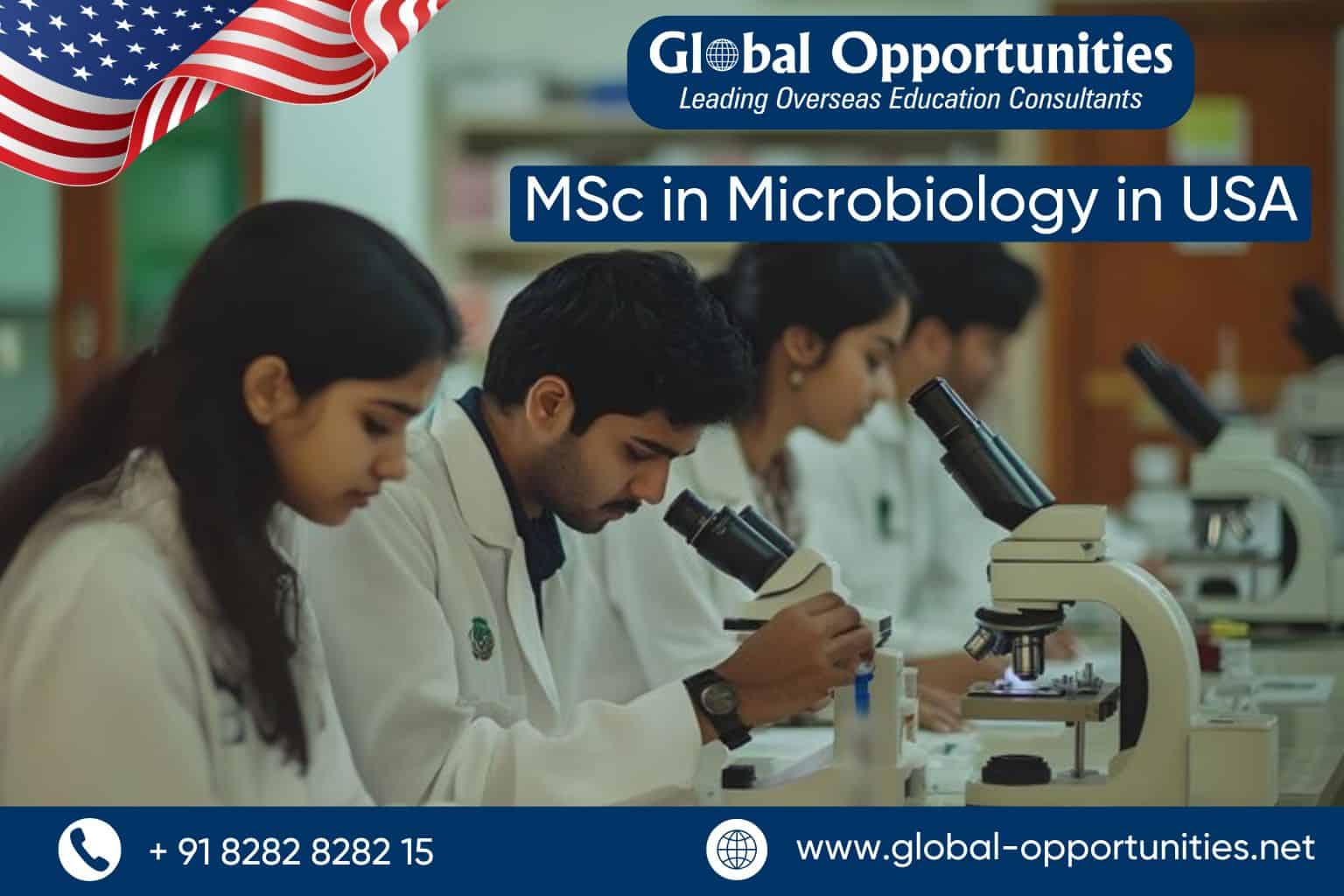MSc in Microbiology in USA : Eligibility, Pros & Cons

Are you someone who is interested in studying MSc in Microbiology in the USA?
What is Microbiology?
Microbiology is the study of the biology of microscopic organisms, viruses, bacteria, algae, fungi, slime molds, and protozoa. In simpler terms Microbiology is the study of microorganisms or microbes.
The market size of Microbiology is valued at US$ 4.61 billion (2023) and as per the US Bureau of Labour statistics the employment for microbiologists is projected to grow at 7% from 2023 to 2033, which is faster than the average of all occupations. Considering the further job outlook about 1900 openings for microbiologists are projected each year, on average over the decade.
The United States is one of the best destinations for international students pursuing postgraduate studies in Microbiology. The country offers a stimulating environment for students seeking to deepen their expertise in microbiology. This article explores the advantages and disadvantages of pursuing MSc in Microbiology in the USA and further outlines the eligibility criteria for international students interested in the program.
If you’re exploring various postgraduate opportunities, you might also be interested in our guide on MSc in Project Management in USA, which highlights another dynamic and career-oriented program.
Advantages of Pursuing an MSc in Microbiology in the USA
Top Tier Universities and Research Opportunities
The USA is home to some of the world’s leading universities like Harvard, Stanford and MIT, etc. Universities are reowned for their cutting edge research in microbiology, and students benefit from the access to advanced laboratories, innovative technologies and opportunities to collaborate with leading microbiologists and many microbiology programs also emphasize hands-on research, allowing students to contribute to meaningful scientific discoveries.
Diverse Specializations
Microbiology is a vast field, which encompasses areas like microbial genetics, environmental microbiology, virology, immunology and industrial microbiology. Universities in the USA offer a wide array of specializations which enables students to focus on their area of interest, whether they aspire to work in healthcare, pharmaceuticals, agriculture or biotechnology.
Access to Funding and Scholarships
Many US universities offer scholarships, assistantships and fellowships to international students, especially those with strong academic backgrounds. These financial aids help alleviate the burden of tuition fees and living expenses, making education in the USA more accessible for international students.
Global Recognition
A degree from a US institution is highly respected worldwide, which further enhances the global employability. Graduates often find job opportunities in multinational corporations, government agencies, research institutions and universities across the globe. In addition to this, students who aspire to pursue a Phd or postdoctoral research often benefit from the global network and reputation of US universities.
Cultural Diversity and Networking
Studying in the USA, exposes students to a multicultural environment. Interacting from diverse cultural and educational backgrounds enriches students’ perspectives, improves their adaptability and enhances the global network. For personalized guidance on pursuing your degree, our Study in USA Consultants are here to help you navigate the application process and find the best program for your goals.
Disadvantages of Pursuing an MSc in Microbiology in the USA
High Tuition Fees and Living Costs
One of the primary challenges for international students is the cost of education in the USA. The tuition fees for MSc programs in microbiology can range from $20,000 to $50,000 per year, depending on the university. In addition, the cost of living in cities like Boston, New York and San Francisco can be quite high, putting a strain on students’ finances.
Strict Visa and Work Regulations
The visa process for studying in the USA can be complex and time consuming. International students are required to obtain an F-1 visa, and the regulations around the work opportunities during and after the program can be restrictive. Although students on F-1 visas are allowed to work part time on campus, off campus opportunities often depend on obtaining Optional Practical Training (OPT) or sponsorship from employers. You can also contact our USA Study Visa Consultants to make this process easy for you.
Competitive Admissions Process
Admission to top tier US universities is highly competitive, with programs requiring strong academic records, relevant research experience and excellent recommendation letters. Students often need to prepare extensively to meet the academic and professional expectations of these institutions.
Cultural Social Adjustments
For a majority of international students, especially from India, adjusting to a new culture, education system, and social environment in the USA can be challenging. The pressure of performing well academically while navigating cultural differences can lead to stress and isolation, especially in the early stages of the program.
If you’re considering different postgraduate programs, you might want to explore our detailed guide on MSc in Forensic Science in USA, which delves into another exciting and specialized field of study.
Eligibility for MSc in Microbiology in the USA
To apply for the MSc in Microbiology program in the USA, international students must meet several key requirements. While specific criteria may vary from one university to another, the general eligibility criteria are:
Bachelor Degree in Related Field
Applicants must hold a bachelor’s degree in microbiology, biology biotechnology or a related discipline. Most universities require a strong academic record with a GPA of at least 3.0 on a 4.0 scale, although some institutions may have higher requirements.
English Language Proficiency
Since courses are conducted in English, international students must demonstrate proficiency in the language. Most universities require a minimum TOEFL score of 90 to 100 or an IELTS score 6.5 to 7.0 and some programs may also accept PTE or Duolingo English Test scores.
Graduate Record Examination (GRE)
A majority of US universities require GRE scores as part of the application process. While the GRE is not mandatory for all programs a strong GRE score can significantly enhance your application, especially for competitive programs.
Letters of Recommendation
A majority of US universities require 2 to 3 Letters of recommendation from professors, employers or research supervisors who can vouch for your academic and professional capabilities. These letters should highlight your research experience, academic performance and potential for success in a graduate program.
Statement of Purpose
The SOP is a critical component of your application, it is where you outline your academic background, research interests, career goals and reasons for choosing the particular program and university. A well-crafted SOP can make your application stand out among other candidates.
Work Experience
While not always mandatory, having a prior research or work experience in microbiology or a related field can significantly strengthen your application. This experience demonstrates your commitment to the field and your readiness for advanced study and research.
Financial Proof
International students must provide evidence of financial support to cover tuition fees and living expenses during their studies. This may include bank statements, scholarship letters or financial affidavits.
Why Choose Global Opportunities?
Global Opportunities is a premier study abroad consultants which has been in the study abroad business for the last 23+ years. We help students shortlist the best US university according to their profile and provide end to end US F-1 study visa services.
For more information on how to apply to universities abroad contact Global Opportunities on +91 8282828215 or email us at info@global-opportunities.net
Conclusion
Pursuing an MSc in Microbiology in the USA offers a wealth of opportunities for international students. This ranges from cutting edge research and global recognition to diverse career paths. However, the high cost of education and visa challenges can be significant obstacles for the USA. To succeed, prospective students must carefully weigh the advantages and disadvantages, meet the eligibility criteria, and plan strategically for financial and cultural adjustments.
If you’re interested in exploring related fields, check out our comprehensive guide on pursuing an MSc in Bioinformatics in the USA, which delves into data-driven biological research and cutting-edge technology.
By choosing the right program and preparing thoroughly, international students can make the most of their experience and build a rewarding career in microbiology.
FAQs
Is microbiology a good career in the USA?
Studying microbiology is a promising path in the field of science. A degree in microbiology can lead to various career opportunities, including roles such as a biomedical scientist.
What are the career opportunities available after doing MSc in microbiology in the USA?
Some of the lucrative career opportunities available after completing MSc in microbiology in the USA are microbiologist, research scientist, biotechnologist, clinical microbiologist, food scientist, etc.
Does Microbiology have scope in the USA?
It is important to know that the development of all types of antibiotics involves the use of microbiology. Therefore, it is definite that the scope of microbiologists in this field is relatively large. In addition to this some of the big names from the US pharmaceutical industry, like Gilead Sciences and Pfizer, also hire several microbiologists every year.



